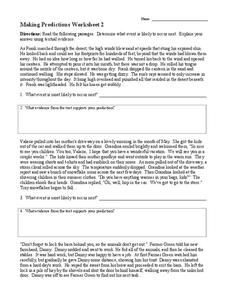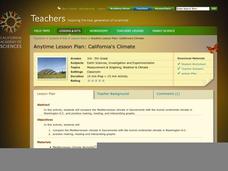College Board
2018 AP® Environmental Science Free-Response Questions
Less than nine percent of all AP Environmental Science test takers scored a perfect five on the exam in 2018. Learn from the best answers as well as the common mistakes thanks to the College Board. Four questions from the test covering...
CK-12 Foundation
CK-12 Earth Science Concepts for Middle School
Explore a variety of science concepts in an interactive textbook created for middle school scholars. A lengthy table of contents takes readers to pages comprised of a subject overview, outline, and summary. Follow links further to find...
Curated OER
Fracking: Positive or Negative Impact?
Your teenagers may have heard of fracking, but do they really know what it is? And could they debate the benefits and risks? Educate your environmental science class with a activity about hydraulic fracturing, non-renewable energy...
CK-12 Foundation
Right Triangles, Bearings, and Other Applications: Sailing Race
Help your class get their bearings when it comes to right triangles. Pupils determine distances traveled or components given the bearing of a sailboat using an interactive. The scholars develop a sense of finding the bearings of a given...
Concord Consortium
Sharp-Ness of Bends
Define the sharpest in the group. Given a section of a trail map, pupils determine a method to measure the sharpness of each turn in the path. Individuals then determine what modifications to their formulas to make to find the sharpness...
Calvin Crest Outdoor School
Survival
Equip young campers with important survival knowledge with a set of engaging lessons. Teammates work together to complete three outdoor activities, which include building a shelter, starting a campfire, and finding directions in the...
K5 Learning
Why Does the Ocean have Waves?
Six short answer questions challenge scholars to show what they know after reading an informational text that examines waves—what they are, what causes them, and how different Earth factors affect their size and strength.
K12 Reader
What’s the Forecast?
A reading comprehension passage is illustrative for both language arts and earth science skills. Using context clues, learners find out how to predict the weather using various tools. They then answer five reading questions about what...
E Reading Worksheets
Making Predictions #2
What happens next? Learn to make predictions with five short passages. As kids finish reading each passage, they jot down what they think will happen next, as well as the evidence from the text that supports their prediction.
KOG Ranger Program
Burning Decisions
There's a big difference between a comfortable campfire and a raging forest fire, but they both often start in the same ways. Follow a forest maze that leads to either a controlled burn that extinguishes easily, or a large,...
NASA
How Does a Hurricane Form?
Young meteorologists examine the formation of a hurricane in a resource focused on severe weather conditions. Once they learn that a hurricane is also a tropical cyclone, and detail the different levels associated with tropical storms,...
Teacher Web
Plant Reproduction—Structure of a Flower
What happened to the plant in math class? It grew square roots. Here, a set of 11 worksheets provide a review of plant reproduction. It includes the structure of a flower and each part's function, pollination, fertilization, seed...
Columbus City Schools
It’s Electric!
Shocking! Who knew so many great ideas existed for teaching middle schoolers about electricity? Find them all within this energetic framework. You'll light up at the variety of printable and web-based resources within! After building...
Macmillan Education
Understanding Poetry (Elementary)
Introduce young readers to poetry analysis with a worksheet that uses Emily Bronte's "Spellbound" to model how poets use word choice, the sounds of words, the repetition of words, and rhyming patterns to create the mood, tone, and...
Soft Schools
Similes and Metaphors
Do your kids a little more practice identifying similes and metaphors? This worksheet can be used as extra practice, for homework, or as part of a group activity
KOG Ranger Program
Leading Causes of Wildfires in Oregon
You've heard of "wildfire season," but what types of weather and conditions lead to increased wildfires? Young firefighters learn about common sources of wildfires, safe ways to clear debris near their homes, and the most effective ways...
Cambridge English
Words Related to Weather: Vocabulary Activities
Study all things weather with a packet of weather vocabulary activities. The 12-page packet includes three crosswords varying in difficulty, a mixed letter sort, a sentence sort, weather word search, and fill-in-the-blank sentences with...
UAF Geophysical Institute
Observing the Weather
How can you predict the weather without any technology? Young scientists learn to forecast the weather using traditional Native American techniques. Based on their observations of the weather, as well as talking to their classmates, they...
K12 Reader
The Snow Blows
Brrr! It's cold outside when it snows. Have your class read this poem about the snow to practice the long /o/ sound, -ow words, and reading comprehension. After reading, they respond to three questions.
K12 Reader
Taiga Ecosystems
Introduce your class to another type of ecosystem, the taiga ecosystem, through a reading passage. Class members read the text and then respond to five reading questions about the content of the passage.
K12 Reader
What’s Eating You?
Introduce your class to producers, consumers, and pollinators with a reading passage. Class members read the text and respond to five related questions.
K12 Reader
Water Carves the Land
What affect do bodies of water have on the world around us? Kids can find out by reading this passage. After reading, they answer five questions related to the text.
World Wildlife Fund
Land of the Midnight Sun
From days of 24 hour sunlight, to endless nights that last for days, the Arctic is a very unique place to live. Examine the seasonal changes that occur in the northern-most reaches of the globe and the impact they have on the plants and...
California Academy of Science
California's Climate
The United States is a large country with many different climates. Graph and analyze temperature and rainfall data for Sacramento and Washington DC as you teach your class about the characteristics of Mediterranean climates. Discuss the...
Other popular searches
- Gone With the Wind
- Wind Erosion
- Windows Movie Maker
- Wind in the Willows
- Inherit the Wind
- Wind Energy
- Gilberto and the Wind
- Global Winds
- Window Jeannie Baker
- Hello Goodbye Window
- Wind Direction
- Wind Power

























